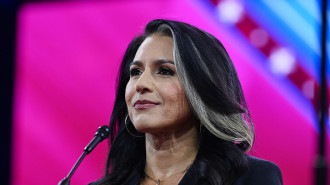Bahrain opposition leader rejects charges as trial begins
A prominent opposition leader in Bahrain pleaded not guilty Monday at the opening of his new trial for "promoting political change through forceful means", judicial sources in Manama said.
Addressing the Higher Criminal Court, Ibrahim Sharif said the charges against him were based on "assumptions" and not facts.
Sharif, who headed the secular Waed ("promise") party, was freed on June 19 after spending four years in jail over his involvement in 2011 Shia-led anti-government protests.
But he was re-arrested three weeks later for "violating the law".
Sharif was arrested after giving a speech at a public gathering on 10 July to commemorate the death of Hussam al-Haddad, a 16-year-old boy who was shot dead by riot police in 2012 during ongoing protests in the kingdom that started during the Arab Spring.
He spoke about the need for change in Bahrain, highlighted the political opposition's commitment to non-violence and urged the government to introduce key economic reforms.
| Sharif spoke about the need for change in Bahrain, highlighting the opposition's commitment to non-violence |
The activist is accused of promoting "violent disorder" in a "direct attempt to undermine stability in the kingdom and overthrow the regime", in addition to other charges.
Quashing dissent and curtailing freedom of expression
Amnesty International condemned the trial as part of the authorities' ongoing attempt to quash dissent and curtail freedom of expression in the country.
"Speaking freely is not a crime - the fact that Ibrahim Sharif is going on trial for giving a speech calling for reform is absurd," Amnesty International's Said Boumedouha said.
"The Bahraini authorities are clearly punishing him merely for peacefully exercising his right to freedom of expression."
The next hearing will take place on 12 October.
Sharif played a prominent role in the month-long protests and was later among a group of 20 activists tried for plotting to overthrow the Sunni rulers of Shia-majority Bahrain.
The opposition in Bahrain, which is home to the US Fifth Fleet, is pressing for a constitutional monarchy and an elected prime minister.
Sharif is not the first political activist in Bahrain to face trial based on spurious charges.
In June 2015 Sheikh Ali Salman, the Secretary General of Bahrain's main opposition party, al-Wefaq National Islamic Society (al-Wefaq), was sentenced to four years in jail on similar charges of inciting hatred, inciting others to disobey the law, and publicly insulting the Interior Ministry. His appeal begins on 15 September.
On 18 August, the authorities arrested another al-Wefaq leader and former member of parliament, Sheikh Hasan Isa, at Bahrain International Airport after his return from travel.
Al-Wefaq said in a statement that there is no information on the charges against him and that his lawyer was not allowed to attend the interrogation with him at the Interior Ministry's Criminal Investigations Directorate.
| Abu Deeb was arrested in 2011 because he called for a teachers’ strike in solidarity with those calling for government reform |
At least 89 people have been killed in clashes with security forces since 2011, while hundreds have been arrested and put on trial, rights groups say.
Political prisoner denied medical treatment
In another development, the Jordanian website al-Bawaba has reported that the political prisoner Mahdi Isa Mahdi Abu Deeb's health is deteriorating as he has been denied medical treatment while in prison.
Unnamed sources told al-Bawaba that without treatment the neck and knee injuries he has sustained have worsened and he is no longer able to move or walk without assistance.
He has been charged with halting the educational process, inciting hatred, attempting to overthrow the ruling system by force and spreading false information. According to Amnesty International, no evidence to support these charges have been made public.
Abu Deeb was arrested in 2011 during the so-called Arab Spring protests because he called for a teachers' strike in solidarity with those calling for government reform.
He was kept in solitary confinement for 64 days after his arrest.
Abu Deeb is currently serving a five-year jail sentence.







 Follow the Middle East's top stories in English at The New Arab on Google News
Follow the Middle East's top stories in English at The New Arab on Google News


